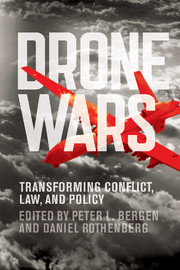Book contents
- Frontmatter
- Contents
- Contributors
- Acknowledgments
- Introduction
- Part I Drones on the Ground
- 1 My Guards Absolutely Feared Drones
- 2 Decade of the Drone
- 3 Just Trust Us
- 4 The Boundaries of War?
- 5 What Do Pakistanis Really Think About Drones?
- Part II Drones and the Laws of War
- Part III Drones and Policy
- Part IV Drones and the Future of War
- Index
- References
2 - Decade of the Drone
Analyzing CIA Drone Attacks, Casualties, and Policy
Published online by Cambridge University Press: 05 December 2014
- Frontmatter
- Contents
- Contributors
- Acknowledgments
- Introduction
- Part I Drones on the Ground
- 1 My Guards Absolutely Feared Drones
- 2 Decade of the Drone
- 3 Just Trust Us
- 4 The Boundaries of War?
- 5 What Do Pakistanis Really Think About Drones?
- Part II Drones and the Laws of War
- Part III Drones and Policy
- Part IV Drones and the Future of War
- Index
- References
Summary
The Need for Accurate Information About Drone Strikes
The rise in the covert use of drones outside of traditional battlefields has come to define US counterterrorism efforts under President Obama. It serves as one of the core policies defining the transition from George W. Bush’s “Global War on Terrorism” to what Obama has termed a “war with a specific network, al-Qaeda, and its terrorist affiliates who support efforts to attack the United States, our allies, and partners.”
The rapid increase in covert drone attacks managed by both the CIA and US Joint Special Operations Command outside of traditional war zones present multiple moral, legal, and strategic questions regarding new technologies and the changing nature of warfare.
While the debate on these issues is robust, if not highly divisive, substantively addressing drone policy requires establishing a firm factual foundation. Using reports from a variety of reliable news outlets, New America – a nonpartisan think tank in Washington, DC – has gathered material on drone strikes from 2002 to the present. The media outlets used by New America for its database of drone strikes are: the Associated Press, Reuters, Agence France-Presse; US newspapers: the New York Times, the Washington Post, the Los Angeles Times, and the Wall Street Journal; British newspapers: the Telegraph and the Guardian; and Pakistani news outlets: the Express Tribune, Dawn, the Daily Times, Geo TV, and the News; as well as the news outlets BBC and CNN.
- Type
- Chapter
- Information
- Drone WarsTransforming Conflict, Law, and Policy, pp. 12 - 41Publisher: Cambridge University PressPrint publication year: 2014
References
- 5
- Cited by



